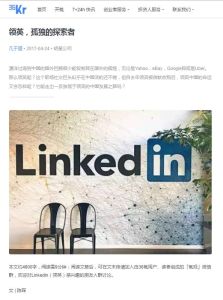Join getAbstract to access the summary!

Join getAbstract to access the summary!
Chen Chen
LinkedIn – the Lonely Explorer
36Kr, 2017
What's inside?
Many businesses trying to compete in China fell by the wayside. Why is LinkedIn still standing?
Recommendation
American-based LinkedIn often has been cited as the only high-profile, foreign Internet business to have made it in China. The platform offers something Chinese people covet but can’t access through local competitors: connections to highly reputable companies and universities in the West. However, LinkedIn also seems to have gotten some things about the Chinese market right. Chinese tech media website 36Kr’s entrepreneurship reporter Chen Chen explains LinkedIn’s successful localization strategy. However, on June 23rd, 2017, LinkedIn China CEO Shen Boyang announced that he will be leaving the company. Insiders say that after Microsoft took over, executives decided not to renew his contract. Some experts whisper that LinkedIn China may be falling short of expectations. Chitu, in particular, faltered against domestic competitors despite LinkedIn’s considerable investment in the product. Chen ends his article in a cautionary note: The question he can’t answer is whether Linkedin China’s success will continue. Time will tell. Meanwhile, getAbstract recommends this article to corporate executives and business managers who are thinking about entering the Chinese market.
Summary
About the Author
Chen Chen is a staff writer for 36Kr, a leading tech media website in China that provides reports on businesses and start-ups.
















Comment on this summary